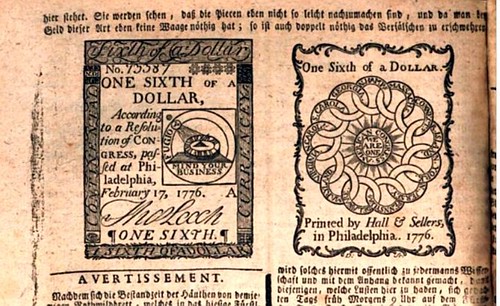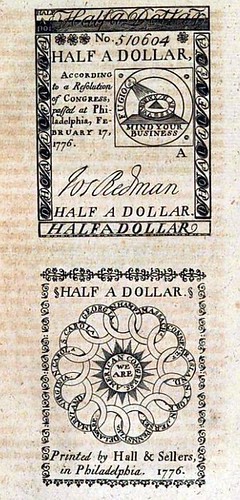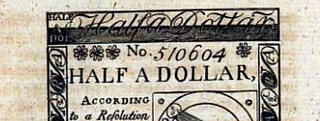
PREV ARTICLE
NEXT ARTICLE
FULL ISSUE
PREV FULL ISSUE
MORE ON COLONIAL PAPER MONEY ILLUSTRATIONSReaders also had comments about Julia's find of illustrations of Continental paper money in a 1777 German publication. Ralf Böpple provided these translations. Thank you! -Editor Quoting a letter dated January 1st, 1777, from a camp next to Fort Knyphausen, pp. 171, second paragraph: “Herewith I add for you – as compensation for the postal charges – a piece of paper money. In Philadelphia and all provinces, which are not occupied by us, it is worth 1/2 Spanish dollar. I also own a 7-thaler-piece, on which the United American States are not mentioned.” Personal note: no idea if there was an issue of this paper money denominated “7 dollars”. I haven’t investigated into the source of this printing, but if it is a hand written letter, could it be that the original read “1/7”, and that the writer was referring to a piece of paper money reading “one seventh of a dollar”? Deutsche Zeitung: It’s the paragraph above the pictures (I will do my best to follow the somewhat flowery original tone of this publication): “Look now! We reprint here two little pictures because it has been becoming a trend lately; Those who have frequent contact with the colonies may find it a useful curiosity. They represent the two sides of a piece of paper money which is now circulating in America, which is worth about 21 kreutzer in our money. The number 73387 and the signature are written in red ink, everything else is printed the way you see it here. You will realize that the pieces are not really easy to copy, and since you do not need a balance for this kind of money, this is twice as important to make falsification difficult.” 
Erik Goldstein, Senior Curator of Mechanical Arts & Numismatics at The Colonial Williamsburg Foundation writes:
Interesting observation. But without specific contemporary documentation we may never know in what order the numbered notes were dispersed. If the entire print run was immediately numbered and signed, perhaps the last notes printed ended up at the top of the pile, making the higher-numbered ones among the first to be circulated. -Editor Erik adds: "I think it was/is commonly believed that these 17 Feb 76 fractional notes, issued in huge numbers, were printed & signed over many months, if not a few years (at least until inflation exploded). I recall Joe Lasser telling me that some of the signatories he’d seen on them weren’t authorized by Congress to sign the bills until much later than the date of issue." Julia Casey writes: "Many thanks to all who replied! I greatly appreciate the assistance and comments." Thanks, everyone! These are interesting discoveries, and who knows what other gems are waiting to be found as more and more publications get digitized and made available to researchers. -Editor
To read the earlier E-Sylum article, see:
THE BOOK BAZARREWayne Homren, Editor The Numismatic Bibliomania Society is a non-profit organization promoting numismatic literature. See our web site at coinbooks.org. To submit items for publication in The E-Sylum, write to the Editor at this address: whomren@gmail.com To subscribe go to: https://my.binhost.com/lists/listinfo/esylum All Rights Reserved. NBS Home Page Contact the NBS webmaster 
|

